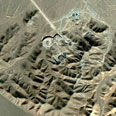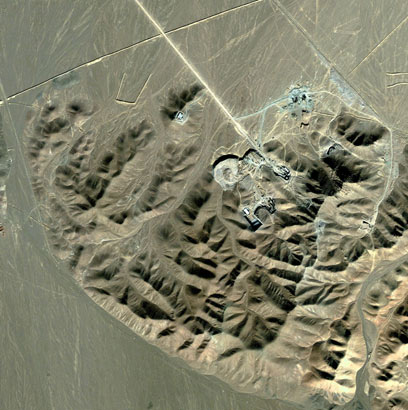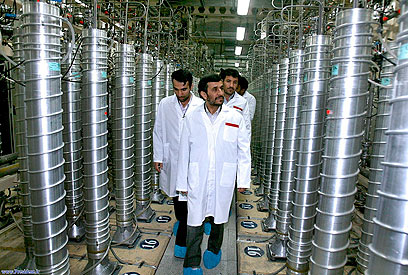
Iran atomic chief says 'explosives' cut power at Fordo
Fereydoon Abbasi Davani tells IAEA meeting electric power lines from city of Qom to key underground nuclear facility were 'cut using explosives' but 'no damage done.' Adds: Zionist nukes global threat
Power lines to Iran's most controversial nuclear enrichment plant were blown up a month ago, according to its atomic energy chief, who alleged on Monday that the UN nuclear watchdog may have been infiltrated by "terrorists and saboteurs."
The accusation coincides with strident Israeli warnings about the need to stem Iran's nuclear program with a threat of force, as well as new diplomatic efforts to secure better inspections and an abandonment of work that could be used to develop atomic weapons.
Related articles:
- McCain: Iran situation a 'train wreck'
- Op-ed: Iran threats help Bibi, Barak
- Experts: Israel could send Iran back to Stone Age
The UN International Atomic Energy Agency (IAEA) had no immediate response but Fereydoun Abbasi-Davani's comments seemed certain to overshadow those efforts.
He told the IAEA's annual assembly that power lines from the city of Qom to the underground Fordo plant had been blown up on August 17, and "the same act" had been carried out earlier on power lines to Iran's main enrichment plant, near the town of Natanz.
The plants use centrifuges to "enrich" uranium to a higher concentration of the fissile material that be used in nuclear power plans or nuclear weapons.
Fordo worries the West most as it produces uranium of 20% fissile purity, more than needed for power plants and only a short technical step from the 90% needed for a warhead.
"It should be recalled that power cut-off is one of the ways to break down centrifuge machines," Abbasi-Davani said.
On August 18, he said, an IAEA inspector had asked for an unannounced visit to Fordo, built 80 meters below ground to better protect it against enemy strikes.
"Does this visit have any connection to that detonation? Who, other than the IAEA inspector, can have access to the complex in such a short time to record and report failures?" he asked.
"Terrorists and saboteurs might have intruded the agency and might be making decisions covertly," he said, according to an official Iranian translation of his speech in Farsi.
He later told reporters that back-up power and other defenses had prevented any damage to the Fordo plant.
Abbasi-Davani did not say who he believed was behind the attacks, though Iran has often accused Israel and Tehran's Western foes of trying to sabotage its nuclear program.
At least four scientists associated with the program have been assassinated since 2010, most recently in
January, and the Stuxnet computer virus was used to cause malfunctions in Iran's nuclear enrichment equipment.
But Abbasi-Davani did for the first time explicitly and publicly suggest that the IAEA might be complicit in sabotage.
Mark Fitzpatrick, the head of non-proliferation at the International Institute for Strategic Studies, said that according to the IAEA 696 centrifuges are being used to enrich uranium inside Fordo, with another 1,444 installed but not yet operational.
If these machines lost their power supply, they would be severely damaged, he was quoted by British newspaper The Telegraph as saying.
"If there was no power source to keep them spinning, and if they stopped, as they slowed down they would crash," he said.
Fitzpatrick noted that the electricity supply for Iran's other enrichment plant at Natanz had been singled out for sabotage, with one power surge destroying 50 centrifuges. It was "entirely conceivable" that Fordo could be encountering the same attention, he said.
Davani, who also serves as Iran's vice president, told the annual gathering in Vienna that "nuclear weapons in the hands of the Zionist regime pose a threat to international peace and security."
He denied allegations that Iran was pursuing a nuclear bomb. "To liberate Palestine from the conquering Zionists there is not need for nuclear weapons. The solution is democracy and the holding of a referendum among the original inhabitants of Palestine," Davani said.
The IAEA has voiced growing concern about what Western diplomats describe as persistent Iranian stonewalling of its attempts to conduct detailed inspections of Iran's research.
An IAEA report issued late last month did indicate that inspectors had visited Fordo on August 18, but it did not refer to any damage.
Instead it said Iran had doubled the number of centrifuges at Fordo, despite UN sanctions, Western attempts to limit Iran's oil exports, and the threat of an Israeli attack.
A Western diplomat said the Iranian allegation that the agency may have been infiltrated by terrorists was "insulting to the IAEA and its professional staff".
"Their (Iran's) assertions are becoming more desperate and ludicrous to distract attention away from their lack of cooperation and duplicity in dealing with the agency," he said.
Ynet's military analyst Ron Ben-Yishai explained that the covert war against Iran - initiated by the US, Israel and Britain - is ongoing. He said the sabotage at Fordo has been confirmed and proves that Iran's nuclear work can be stopped without the use of bunker buster bombs.
EU foreign policy chief Catherine Ashton is due to meet Iran's chief nuclear negotiator on Tuesday on behalf of six major powers, and IAEA head Yukiya Amano said on Monday that his agency would hold more talks with Iran about inspections aimed at allaying Western concerns.
Abbasi-Davani, himself wounded in an attack in Tehran two years ago, made clear his view that sabotage would not slow Iran's nuclear program, which it says is purely peaceful.
Israel, believed to be the Middle East's only nuclear-armed state, sees Iran's atomic work as a threat to its existence and has been suggesting it could launch an attack on Iran to prevent it reaching nuclear weapons capability.
Israeli Prime Minister Benjamin Netanyahu, who has been pressing Washington to threaten military action against Iran's nuclear program, said on Sunday that Iran would be on the brink of being able to build a nuclear bomb in six or seven months.
The United States and its allies have launched a major naval exercise in the Gulf that they say shows a global will to keep oil shipping lanes open as Israel and Iran trade threats of war.
Abbasi-Davani said Iranian experts had devised "certain ways through which nuclear facilities remain intact under missile attacks and air raids."
- Follow Ynetnews on Facebook and Twitter
- Receive Ynetnews updates directly to your desktop












